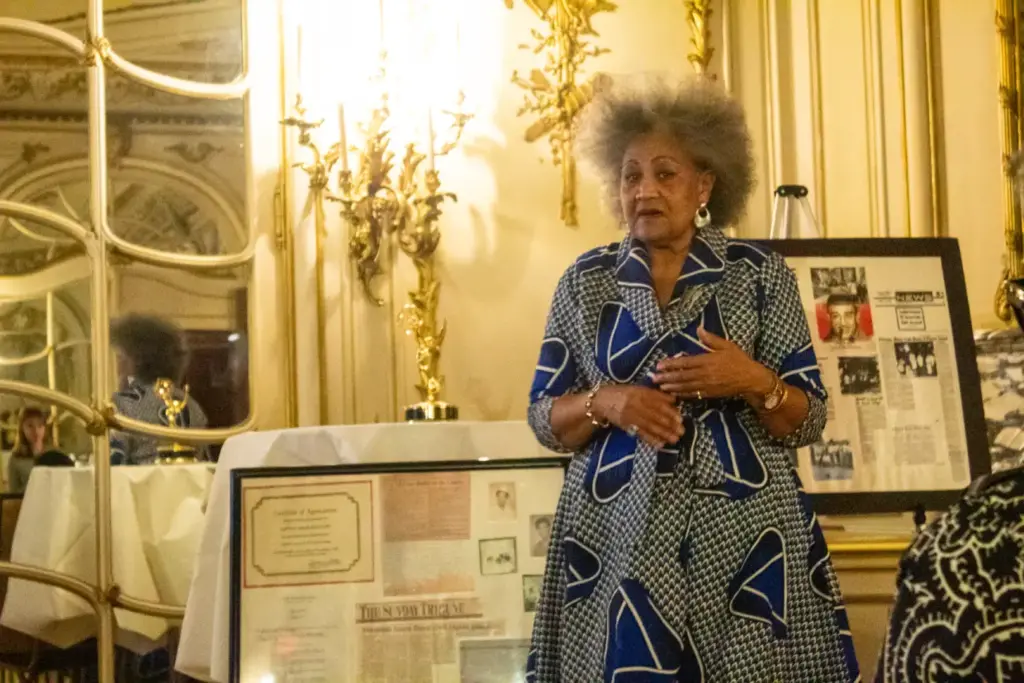Girard College Freedom Fighter Bernyce Mills DeVaughn Preserves History by Sharing Her Story at Arcadia

CBS3 came to Arcadia’s campus on February 15 when Girard College Freedom Fighter and Emmy award winner Bernyce Mills DeVaughn visited Arcadia University for a talk in the Grey Towers Castle Rose Room. She displayed posterboards full of photographs and other pieces of memorabilia alongside the Emmy she won for her work in the documentary, “Cecil’s People: The Freedom Fighters.” She welcomed questions about anything that was displayed and referenced many of the photos throughout the lecture to provide context and explain their significance.
DeVaughn grew up in Norfolk, Va., and moved to Philadelphia at a young age. As children, she and her sister sold peanuts out of their father’s truck and donated the proceeds to the bail of those imprisoned for protesting. When she moved to Philadelphia, DeVaughn marched and both funded and participated in protests with the Freedom Fighters under Cecil B. Moore.
In 1965, she worked alongside other Freedom Fighters to integrate Girard College in North Philadelphia. At the time, the college was a boarding school that only accepted “poor white males,” despite it being located at the center of a predominantly Black community. When they went to march on the school, however, there was a heavy police presence that forced the protests to go on for much longer than anticipated, but they never let up.
“We marched around the wall every single day,” said DeVaughn, “and it wasn’t easy because there was a heavy police presence. We held benefits so that in the event that any of us got arrested, we would have enough money to pay the bail and get them out.”
She spoke highly of Cecil B. Moore, reflecting on his preparedness for every situation that could have possibly arisen at the time and remembering the care and empathy he led with. At the time of the protests, DeVaughn explained that there was gang violence happening throughout the area. She said that instead of turning his back on the gangs, Moore met with every gang leader and tried to recruit them.
“He said ‘I want you to secure the perimeter of the protests. I want you to protect my people and ensure their safety.’ And they did, they marched with us every day and for the entire seven-month period and there was no gang violence,” explained DeVaughn.
While working with Moore, she was only a 16-year-old high school student who would go out to protest right after completing her homework and chores, in accordance with her mother’s rules. She had a few run-ins with the police and even witnessed her younger sister, who was 14 at the time, get attacked by police dogs and arrested for protesting. “We were brutalized, but we kept going for seven months and 17 days,” she added.
It took years for DeVaughn to see the impact of her work with the Freedom Fighters. She shared a memory of her first visit to Girard College after it was desegregated in 1968. “When I looked out at the Black students, they stood and applauded us,” she said. “I was overwhelmed, I never thought when I was that age I’d be standing in a place looking at something I contributed to.”
From there she continued to travel to schools and churches either by herself or with other Freedom Fighters to share her story and the impact of Cecil B. Moore. “He was a champion here in Philadelphia,” she said, “and we’ve been active around the area to make sure that his legacy is secured, to make sure that the schools are getting the full history of all he did as well as promoting human rights, and to make people aware of the struggles that people endured so that it would be better for the young people of the next generation.”
She then closed the lecture by singing a song she wrote at the end of their protests at Girard College, one that she and other protesters sang along the guarded walls of the school: “Cecil won the battle at Girard College, Girard College, Girard College, Cecil won the battle at Girard College and the walls came tumbling down.”
This event was co-hosted by Arcadia University’s Office of Access, Equity, Diversity, and Inclusion and the Black Awareness Society. It’s part of Arcadia’s month-long celebration of Black history.

